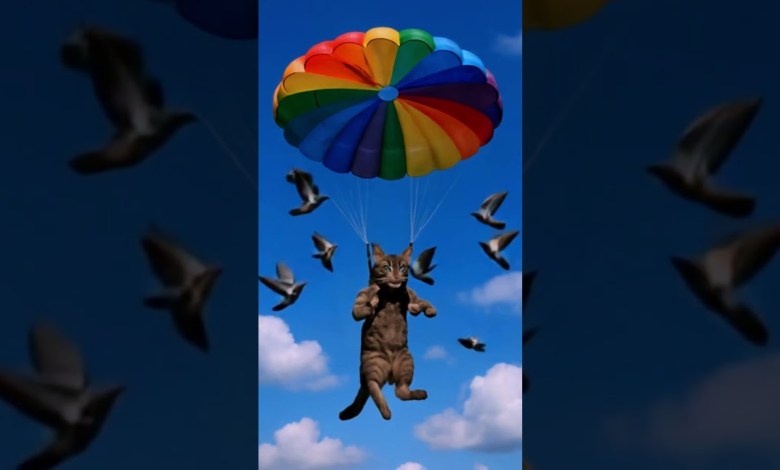Have You Ever Seen a Cat Ascend to the Heavens?

The cat is rising into the sky.
The Power of Music: A Universal Language
Introduction
Music has played a pivotal role in human culture and communication since time immemorial. It is often described as a universal language that transcends borders, cultures, and generations. In this article, we will explore the profound impact of music on society, personal expression, and emotional healing.
The Historical Significance of Music
Ancient Roots
From ancient tribal rituals to classical symphonies, music has been part of humanity’s journey. Archaeological findings suggest that early humans used rudimentary instruments made from bones and wood. These early forms of music were likely used in communal gatherings, spiritual ceremonies, or storytelling, laying the groundwork for the rich tapestry of music we enjoy today.
Evolution Through the Ages
Throughout history, music has evolved dramatically. The Medieval period brought about the development of musical notation, allowing composers to document their creations. The Renaissance and Baroque eras introduced complex harmonies and new instruments, leading to a wealth of creativity. By the time we reach the 20th century, genres exploded into existence, from jazz and blues to rock and hip-hop, each reflecting the societal changes of their time.
Music as a Form of Expression
Personal Stories and Experiences
Music serves as a canvas for artists to express their innermost thoughts and feelings. Many listeners resonate with the lyrics of their favorite songs because they reflect personal experiences. For instance, a heartbreak ballad can comfort someone going through a similar situation, showcasing music’s ability to connect people through shared emotions.
Cultural Identity
Moreover, music often plays a crucial role in defining cultural identity. Traditional music genres are passed down through generations, preserving a community’s history and values. For example, the African drum rhythms, the soulful melodies of the blues, or the energetic beats of reggaeton all carry distinct cultural narratives that celebrate heritage while allowing for contemporary interpretation.
The Emotional Power of Music
Psychological Benefits
Numerous studies have shown the psychological benefits of music. Listening to music can boost mood and alleviate symptoms of depression and anxiety. For instance, upbeat songs can energize individuals, making them feel more motivated and alive. Conversely, soft ballads or classical pieces can promote relaxation and introspection, providing solace in difficult times.
Music Therapy
Music therapy has emerged as a valuable tool for healing. It is being used in various settings, including hospitals, rehabilitation centers, and mental health facilities. Through therapeutic interventions, individuals can explore their emotions, enhance communication skills, and even improve cognitive functions. Music therapy has proven effective in treating conditions such as PTSD, autism, and even chronic pain, showcasing its multifaceted power.
Music Bridging Cultures
Global Collaboration
In today’s interconnected world, music serves as a bridge between diverse cultures. Collaborations between artists from different backgrounds create unique sounds that resonate with a broad audience. A prime example is the fusion of traditional African rhythms with Western pop elements, which has given rise to genres like Afrobeats.
Festivals and Events
Global music festivals such as Coachella, Glastonbury, and Tomorrowland attract thousands of music lovers from around the globe. These events promote cultural exchange and foster community. People from various backgrounds come together to celebrate their love for music, breaking down barriers and building friendships.
The Digital Age and Accessibility
Streaming Platforms
The advent of digital technology has revolutionized how we consume music. Platforms like Spotify, Apple Music, and YouTube make it possible for anyone to access millions of songs anytime, anywhere. This accessibility has democratized the music industry, allowing independent artists to share their work without the need for a major label.
Social Media Influence
Social media has also transformed how music is promoted and discovered. Platforms like TikTok and Instagram enable users to create and share content, leading to viral trends and the rise of new artists. This means that a song can become a global sensation overnight, showcasing the rapid pace at which music evolves in today’s digital landscape.
The Future of Music
Emerging Genres
As music continues to evolve, new genres will likely emerge, influenced by technological advancements and cultural shifts. Genres that incorporate AI-generated music, for example, are beginning to gain traction, pushing the boundaries of what we consider music.
The Role of Technology
Additionally, technologies like virtual reality (VR) and augmented reality (AR) are redefining the live music experience. Artists can create immersive performances that transport audiences into fantastical worlds, making concerts more engaging and memorable.
Conclusion
Music is an integral part of human life, encompassing a wide array of emotions, stories, and cultural expressions. Its ability to connect, heal, and inspire is unmatched. As we move forward into an ever-changing world, one thing remains constant: music will continue to resonate with our hearts and minds, enriching our lives in myriad ways. Whether through a powerful symphony, an uplifting pop song, or a heartfelt ballad, music will always remain a cherished part of the human experience.
Let the power of music inspire you to embrace your own story and connect with others as it transcends boundaries and unites us all.
#cat #rising #sky










![[4 Ways] How to Delete Password on Samsung Phone? [4 Ways] How to Delete Password on Samsung Phone?](https://wp.fifu.app/gsm.vpnwp.com/aHR0cHM6Ly9pLnl0aW1nLmNvbS92aS92cjczdHd6Y09Jay9tYXhyZXNkZWZhdWx0LmpwZw/d14287644cb4/4-ways-how-to-delete-password-on-samsung-phone.webp?w=390&h=220&c=1&p=1105558)

